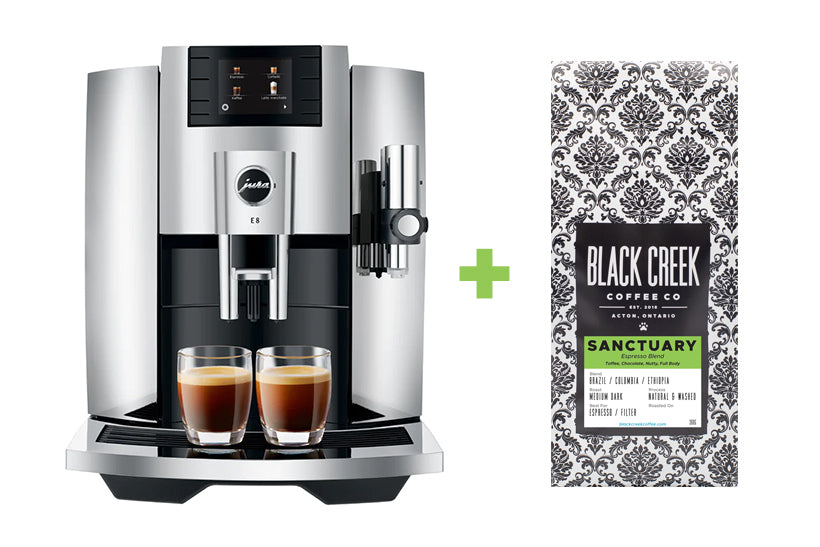
One question we get asked a lot is, "Do you sell an espresso roast that isn't oily?"
The reason for this question is usually that a customer has bought a super automatic home espresso machine from a reputable brand like Jura, Gaggia, Philips, or DeLonghi, and they have read in the manual that oily beans can jam up the machine. So is this true, and what beans are best for automatic espresso machines?
What are the right beans for home espresso machines?
Not all coffee beans (or blends) are created equal, and choosing the right beans can make a significant difference in the quality of your coffee, and the longevity of your espresso machine. In this article, we will explore why less oily coffee beans are the best choice for automatic espresso machines at home.
How does an automatic machine make espresso?
The main benefit of using a super automatic machine at home is that you just fill it with coffee beans and it does the rest. This is a very popular option over the more expensive manual machines and a separate grinder, as it's faster and cheaper. Your morning ritual involves nothing more than a push of a button, and your espresso machine will measure, grind, and tamp the coffee, extract a great espresso, and then dispose of the puck into a bin. These machines can produce great results for less cost and more convenience than more expensive options.

Pros & Cons
The downside to fully automatic machines is that due to the complexity of having all of the processes contained in one machine, they are more difficult to service and can go wrong fairly easily. The complicated cleaning and maintenance routines can put people off espresso altogether.
What makes coffee beans oily?
When coffee beans are roasted, the heat causes the oils inside the beans to come to the surface, creating a shiny, oily appearance. The longer and hotter the roast, the more oils appear.- Light roasted beans are dry on the outside, and may show some oils on the surface after a few weeks.
- Medium roasted beans also appear dry, but some oils will migrate to the surface usually within a week or two.
- Dark roasted beans can be oily straight after roasting, and more oils come to the surface in the following few days.
Every roaster has a different opinion on roast degree, here's an example of our different roast levels, from light, to medium, to dark.

Have a look at our article on how roasting affects flavour for a guide on roasting temperature and oiliness. At Black Creek Coffee we tend to roast light to medium for most of our coffees, and only have one truly dark roast, Halton House.
What is 'Espresso Roast'?
For espresso, most people want a smooth, chocolaty type coffee, with lots of crema (foam), body, and low acidity. Therefore 'espresso roasts' are usually roasted slightly longer and darker, as this helps to achieve the typical taste profile that customers expect. The darker roast also helps the finely ground coffee become more soluble, to be extracted better, and to produce a strong coffee with 'roasty' notes and great crema.
Can I use store bought coffee?
The problem with shopping for 'espresso roast', is that many of the well known brands you see in grocery stores, roast very dark, and the coffee sits on the shelf for a long time becoming stale. They can also include lower quality beans in the blend as the roast is so dark that's all you will taste, not the origin of the beans. The supply chains for large superstores are long, and the coffee they sell can be up to 12 months old, impacting freshness, and increasing the amount of oils present.
Avoid anything that says 'French' or 'Italian' roast, as this is generally a sign of dark, oily beans.
Will oily beans jam up my machine?
In a nutshell, yes. Oily coffee beans will cause problems for automatic espresso machines. The oils build up inside the machine, clogging the mechanisms and causing the machine to malfunction over time. This can lead to costly repairs or even the need to replace the machine entirely.
In addition to causing mechanical problems, oily coffee beans can also affect the taste of your coffee. Oils become rancid over time, so coffee made with oily beans may have a bitter or unpleasant taste. Less oily coffee beans, on the other hand, produce a cleaner, smoother taste with a more consistent flavor profile.
It's all about the crema!
Another benefit of using less oily coffee beans in an automatic espresso machine is that they produce a better crema. Crema is the layer of foam that forms on top of the espresso shot, and it is a sign of a well-made espresso.
When coffee beans are too oily, the crema can be thin and weak, which can impact the overall taste and texture of the coffee. Now whether you drink the crema, remove it, or mix it in is a whole other debate!
Espresso Grinding
Finally, less oily coffee beans are easier to grind, which is important for automatic espresso machines. These machines require finely ground coffee in order to extract the full flavor from the beans. When coffee beans are too oily, they can be difficult to grind evenly, leading to an inconsistent extraction and a subpar cup of coffee. Lots of oils mixed with finely ground coffee create a build up of old, rancid coffee inside your automatic machine that can be very hard to remove.
Conclusion
When choosing beans for your home automatic espresso machine, look for an espresso roast that is also dry or less oily than supermarket bought coffee. Not only will this prevent problems with your machine, it will also produce a much better-tasting espresso.
Recommended beans for home espresso
We currently have two espresso blends that are perfect for home machines:
Yellow Lab, which is a medium roast, full of flavour and very smooth

and our best selling
Sanctuary Espresso Premium Blend, which is medium/dark, but still perfectly dry enough for home machines. We use it as our standard espresso at our Espresso Bar in Georgetown, and the lack of oils help keep our grinders clean and maintenance free.



